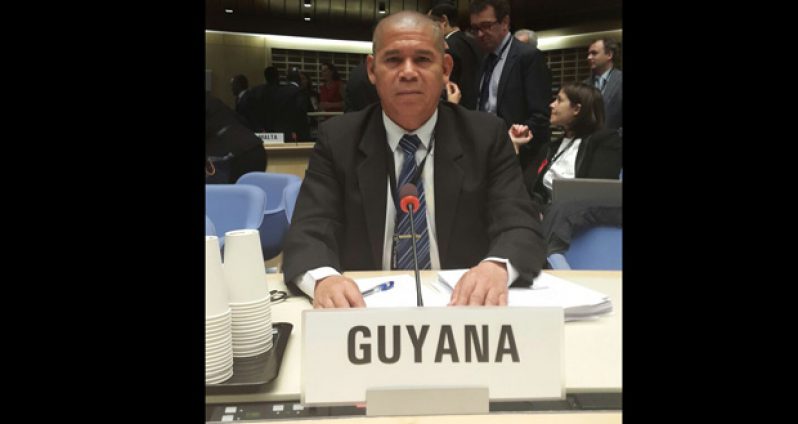The rate of HIV prevalence in Guyana’s prisons is two times higher than that of the general population, Health Minister, Dr George Norton told the 37th Meeting of the UNAIDS Programme Coordinating Board in Geneva, Switzerland on Monday.He said too that Latin America and the Caribbean (LAC) region has been “lagging” in its response to the prevalence of the Human Immunodeficiency Virus (HIV) in prisons and other closed settings. He noted that the time is opportune for this population to be given priority. Minister Norton was at the time delivering his second presentation during the continuation of the 37th Meeting of the UNAIDS Programme Coordinating Board in Geneva, Switzerland.
“Whist we are all aware of the risk for HIV in prisons and closed settings, our response in many ways have been lagging and therefore the time is opportune that we prioritise this population,” Guyana’s Public Health Minister declared. In order to make an impact, Dr Norton said this issue must be tackled at all levels, including at the policy level. “This means, therefore, that at the national level there has to be willingness and openness of all stakeholders to collaborate and share information as much as possible. There has to be leadership from line ministries such as Ministry of Security. Indeed, this brings to bear the concept of health in all policies,” he explained.
“The opponents of prevention services and more particularly condoms in prisons must be educated and lobbied to ensure that there is full understanding of the issues and that decisions are based on evidence and science. Policies have to take on board a comprehensive, combination prevention approach to HIV” – Public Health Minister, Dr. George Norton at the 37th Meeting of the UNAIDS Programme Coordinating Board in Geneva, Switzerland.
However, the Public Health Minister warned that these discussions must be “transparent,” and “real issues,” must be dealt with such as access to HIV education and testing, and the controversial availability of condoms in prisons. “The opponents of prevention services and more particularly condoms in prison must be educated and lobbied to ensure that there is full understanding of the issues and that decisions are based on evidence and science. Policies have to take on board a comprehensive, combination prevention approach to HIV,” he maintained.
HIV IN PRISON POPULATION
In Guyana, Dr Norton said, the prevalence of HIV within the prison population is approximately two times higher than that of the general population. “Whist this may be the case in many other places, depending on how we see and approach this issue, these types of setting could present ideal environments for HIV services. For example, prisoners who are HIV positive and on treatment could be monitored through Direct Observed Therapy (DOT),” the Public Health Minister explained.
However, he said there are many challenges in rolling out programmes in these settings but these issues must be overcome. Dr Norton said that if these challenges are not addressed, in existing prisons or any closed setting, persons may not be able to integrate well within their communities and society.
“What this means for HIV prevention and treatment services? Persons are entering their communities with limited knowledge on HIV prevention and indeed persons started on ARV treatment in the prison setting are far too often lost to follow-up. This gap is significant and the implications are far reaching,” he contended.
Nevertheless, Dr Norton made it clear that the Guyana Government is in full support of any decision to increase access to HIV prevention, treatment and care services for people in prisons and other closed settings. While the provision of HIV services in prisons and closed door settings may be lacking in today’s society, Minister Norton reported that tuberculosis programmes in many cases have done well in these settings.
In the last decade or so, these programmes have been strengthened several fold with the investments from the Global Fund.
Best practices
According to Dr. Norton, many good lessons and best practices are available in this regard. “More importantly, this is a real opportunity for us to all take the comparative advantage of established TB programmes in creating synergies and better efficiency in dealing with the HIV epidemic.”
During his first presentation on Monday, Minister Norton said that in an effort to combat HIV, there must be deep rooted cultural and systemic change, noting that while the Latin America and Caribbean (LAC) Region has set ambitious targets for the period 2020-2030, critical change is needed to create a dent on stigma and discrimination, in addition to the provision of prevention services that will benefit all.














